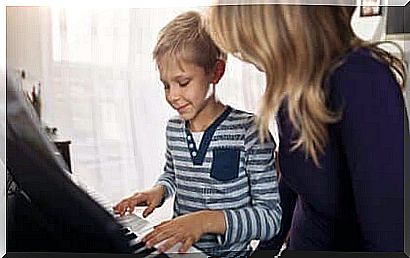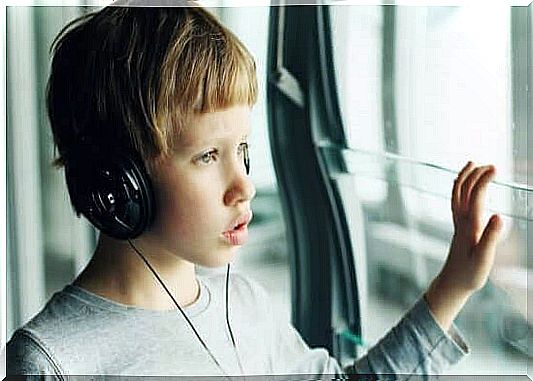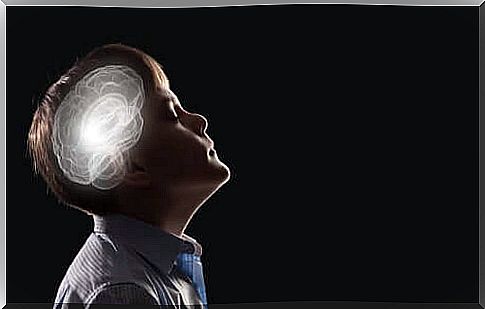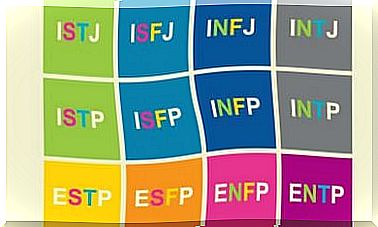Music Therapy For Children With Autism

Music therapy for children with autism has multiple benefits. Their attention wakes up, they open up to their surroundings and even if they cannot verbalize what they are feeling, they find an exceptional channel to express their emotions. Also, according to recent studies, music improves the child’s psychosocial development.
Living with autism is not easy for either the child or his family. The autistic person is immersed in a particular mental and sensory universe in which it is extremely difficult to make contact with the outside world. They don’t understand some codes, some stimuli are painful and certain situations can trigger unexpected reactions.
Professionals try, day after day, to guide parents and create situations in which children can improve their behavior. The aim is not only to improve the quality of their life, but also to find the channels of expression through which they can open up and get in tune with the surrounding environment.
Music never fails. We know that few are immune to its influence, its language awakens in all of us sensations, experiences, memories and infinite emotions. However, for people with autism spectrum disorder, these benefits go far beyond that. A first choice therapy that produces noticeable changes.

Music therapy for children with autism: a great help
The benefits of music therapy for children with autism have been well known for decades. However, the changes, connections and processes produced by music in the brains of people with ASD (Autism Spectrum Disorders) are only recently known.
Nature magazine published in 2018 an interesting article by Dr. Megdha Sharda, of the International Brain, Music and Sound Research Laboratory (BRAMS) in the Psychology Department of the University of Montreal, Canada.
Music therapy has been found to generate changes in children with autism already after a three-month period. The improvements are evident on two levels: communication and expressiveness, but also emotional control.
Stimulation of the visual and auditory areas
Leo Kanner was the first psychiatrist to describe what is now called Autism Spectrum Disorder (ASD). Curiously, he was also the one who advanced the thesis that despite the inter-individual differences in every autistic person, they all show great interest in musical stimuli.
However, music is not just a means for them to find calm. Music therapy for children with autism helps awaken and focus their attention and concentration.
Thanks to MRI scans, we also know that a person with ASD has a higher level of attention than. Neuronal connectivity is also known to be greater in the auditory and visual regions.
This data is very important, given that the autistic child shows evident difficulties in maintaining eye contact.
The hyper-connectivity of the brains of children with ASD finds its balance with music.
The autistic child shows intense cerebral hyperconnection. This means, for example, that any stimulus is processed by all brain areas at the same time. Hence the confusion, hypersensitivity and preference for safe and controllable environments.
Music therapy for children with autism allows you to achieve an almost absolute balance. People with ASD understand and process the characteristics of musical language very well, such as timbre, interval, melody, rhythm, etc.
Furthermore, they are also capable of associating emotions with music, imbuing them with a sense of joy, sadness, introspection, celebration or hope. Really amazing.

Music therapy for children with autism improves their communication
Sensory overstimulation, as we know, is a major problem for children with autism spectrum disorder. The world is too chaotic for them, our voices too deep, the lights too bright.
Everything crowds and shakes in front of them in a nervous way, making it impossible to find a safe space through which to connect with the world around them.
Music is a channel that makes this possible. Music therapy for children with autism improves their emotional state, stimulates the auditory and visual areas allowing them to share their feelings with us, improve their social skills and encourage communication.
Finally, the musical stimuli offer a balance that improves attention. This makes this therapeutic tool a key to access their unique worlds. A way to interact better with them, get excited by their side and gradually improve their sociability.








